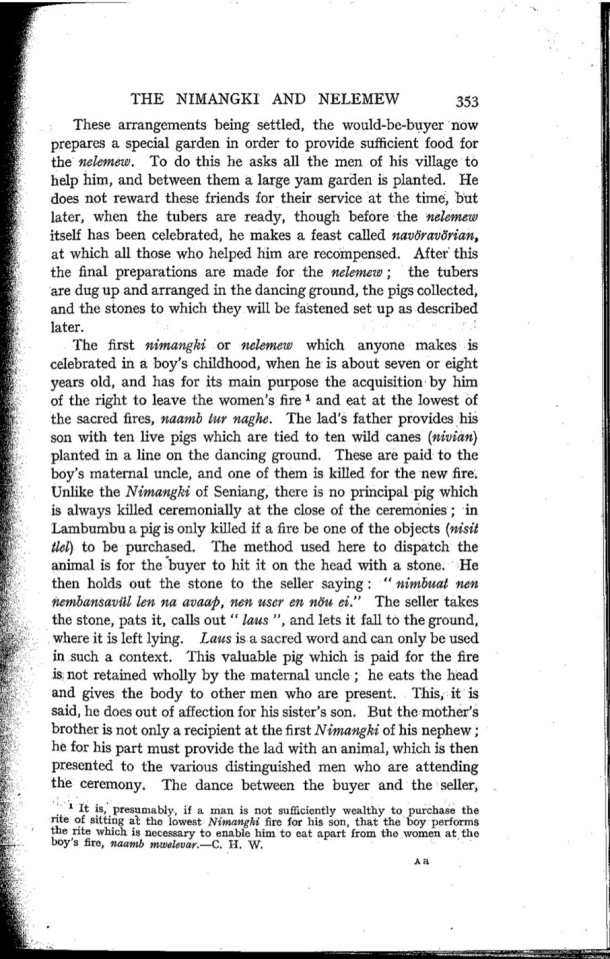|
|  [Note: this transcription was produced by an automatic OCR engine]
>
.
v
,.
1
A
7.
'5
THE NIMANGKI AND NELEMEW 353
These arrangements being settled, the would-be-buyer now
prepares a special garden in order to provide suflicient food for
the nelemew. To do this he asks all the men of his village to
help him, and between them a large yam garden is planted. He
does not reward these friends for their service at the time, but
later, when the tubers are ready, though before the nslemew
itself has been celebrated, he makes a feast called naumwdrizm,
at which all those who helped him are recompensed. After this
the ï¬Ånal preparations are made for the nelemew ; the tubers
are dug up and arranged in the dancing ground, the pigs collected,
and the stones to which they will be fastened set up as described
later. ‘
The ï¬Årst nimangki or mlemew which anyone makes is
celebrated in a boy's childhood, when he is about seven or eight
years old, and has for iG main purpose the acquisition by him
of the right to leave the women's ï¬Åre 1 and eat at the lowest of
the sacred ï¬Åres, naamb tur naghe. The lad's father provides his
son with ten live pigs which are tied to ten wild canes (niuian)
planted in a line on the dancing ground. These are paid to the
boy's maternal uncle, and one of them is killed for the new ï¬Åre.
Unlike the Nimangki of Seniang, there is no principal pig which
is always killed ceremonially at the close of the ceremonies ; in
Lamburobu a pig is only killed if a ï¬Åre be one of the objects (nisit
tlal) to be purchased. The method used here to dispatch the
animal is for the buyer to hit it on the head with a stone. He
then holds out the stone to the seller saying: " nimbuat nan
nembansavfll lm na avaap, nan user an Mu oi." The seller takes
the stone, pats it, calls out “ laus ", and lets it fall to the ground,
where it is left lying. Laus is a sacred word and can only be used
in such a context. This valuable pig which is paid for the ï¬Åre
is not retained wholly by the maternal uncle ; he eats the head
and gives the body to other men who are present. This, it is
said, he does out of affection for his sister's son. But the mother's
brother is not only a recipient at the ï¬Årst N imnngki of his nephew ;
he for his part must provide the lad with an animal, which is then
presented to the various distinguished men who are attending
the ceremony. The dance between the buyer and the seller,
_ I It is,‘ presumably, 11 a man is not sufliciently wealthy to purchase the
me qr sitting at the lowest Nimaugki ï¬Åre ior his son, that the boy performs
the ‘nu which is necessary to enable him to eat apm from the women at the
boys ï¬Åre, mlamb mw-mm,—c. H. W.
A 8
|